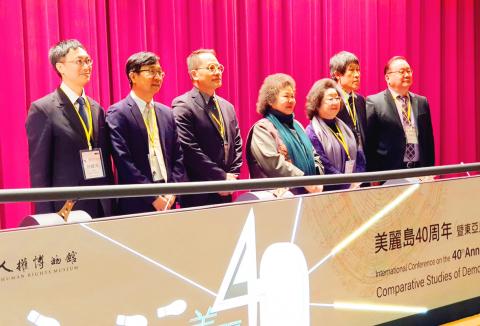The concerted effort of those who went through political persecution kept the flame of Taiwan’s democracy alive, Presidential Office Secretary-General Chen Chu (陳菊) said yesterday ahead of the 40th anniversary of the Kaohsiung Incident.
The oppression, authoritarian rule and Martial Law period in Taiwan gave the people a cause, Chen said at a seminar organized by the National Human Rights Museum in Taipei, which is hosting an international conference titled “Comparative Studies of Democratization in East Asia” ahead of the 40th anniversary of the Kaohsiung Incident on Tuesday next week.
“We suffered much, but we never gave up our hopes or our ideals,” said Chen, who was arrested over the incident and jailed for six years during the White Terror era. “If one can dedicate their life toward realizing an ideal, it would be truly romantic.”

Photo: CNA
The Kaohsiung Incident was a pro-democracy demonstration organized by Formosa Magazine employees on Dec. 10, 1979.
Society changed visibly after the incident, Chen said.
Chen thanked the people of that era for willingly and bravely standing up for protesters, especially for political activist Shih Ming-te (施明德) while he was a fugitive.
She also honored the late Reverend Kao Chun-ming (高俊明) for “being willing to protect people and treat them with decency in those times.”
“The people of the Formosa Incident era will inevitably grow old and pass away, but the new generation, with their ideals for how Taiwan should be and their search for democracy and freedom, that has not and will not change,” Chen said.
This is the spirit that the younger generation must embrace, she said.
Deputy Minister of Culture Kevin Peng (彭俊亨) said that the Kaohsiung Incident was a crucial point in the development of Taiwan’s democracy.
Many young winners of the Ministry of Culture’s awards say they cherish the “free and liberal creative environment” that allows them to create works that have uniquely Taiwanese features, Peng said.
Thanks go to those who helped bring about this freedom, he said.
While Taiwan differs greatly compared with four decades ago, “threats and oppression still exist,” Peng said, calling on the people to uphold and maintain the nation’s democracy.
National Museum of Korean Contemporary History director Chu Chin-oh and Sungkonghoe University professor Kim Dong-choon shared perspectives of history and political sociology from democratization in South Korea.
Hong Kong Human Rights Monitor deputy chair Chong Yiu-kwong (莊耀洸) and Initium Media editor-in-chief Lee Chih-te (李志德) analyzed current events in Hong Kong.
An exhibition on the Kaohsiung Incident is to open tomorrow at the White Terror Memorial Park in Sindian’s Jingmei (景美) area. It runs through Sept. 30.

Taiwan is stepping up plans to create self-sufficient supply chains for combat drones and increase foreign orders from the US to counter China’s numerical superiority, a defense official said on Saturday. Commenting on condition of anonymity, the official said the nation’s armed forces are in agreement with US Admiral Samuel Paparo’s assessment that Taiwan’s military must be prepared to turn the nation’s waters into a “hellscape” for the Chinese People’s Liberation Army (PLA). Paparo, the commander of the US Indo-Pacific Command, reiterated the concept during a Congressional hearing in Washington on Wednesday. He first coined the term in a security conference last

Prosecutors today declined to say who was questioned regarding alleged forgery on petitions to recall Democratic Progressive Party (DPP) legislators, after Chinese-language media earlier reported that members of the Chinese Nationalist Party (KMT) Youth League were brought in for questioning. The Ministry of Justice Investigation Bureau confirmed that two people had been questioned, but did not disclose any further information about the ongoing investigation. KMT Youth League members Lee Hsiao-liang (李孝亮) and Liu Szu-yin (劉思吟) — who are leading the effort to recall DPP caucus chief executive Rosalia Wu (吳思瑤) and Legislator Wu Pei-yi (吳沛憶) — both posted on Facebook saying: “I

Sung Chien-liang (宋建樑), who led efforts to recall Democratic Progressive Party (DPP) Legislator Lee Kun-cheng (李坤城), was released on bail of NT$80,000 today amid outcry over his decision to wear a Nazi armband to questioning the night before. Sung arrived at the New Taipei District Prosecutors’ Office for questioning in a recall petition forgery case last night wearing a red armband bearing a swastika, carrying a copy of Adolf Hitler’s Mein Kampf and giving a Nazi salute. Sung left the building at 1:15am without the armband and covering the book with his coat. Lee said today that this is a serious

Firefighters are working to put out a fire on Taipei’s Yangmingshan (陽明山) reported earlier this morning. The cause of the fire is still under investigation. The Taipei Fire Department said it received a report of a fire at Xiaoyoukeng (小油坑) at 11:17am, dispatching four command vehicles, 16 firetrucks, one ambulance and 72 personnel. The fire is still burning on about 250m² of land, according to initial estimates, as eyewitnesses reported seeing smoke rising from the mountain. The Yangmingshan National Park Headquarters on Facebook said the Qixingshan (七星山) hiking trail starting from Xiaoyoukeng and the Xiaoyoukeng parking lot are closed as firefighters work to put